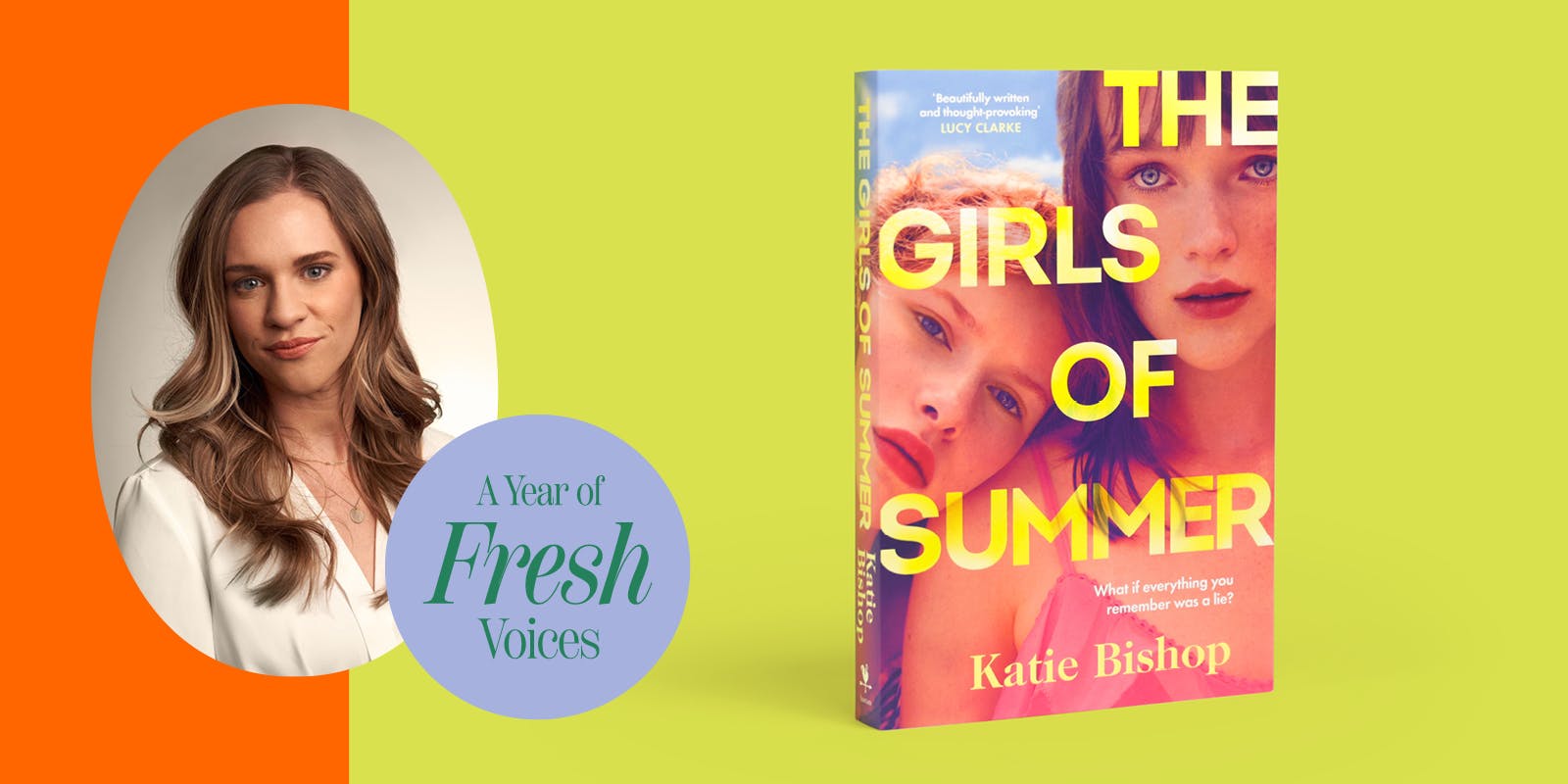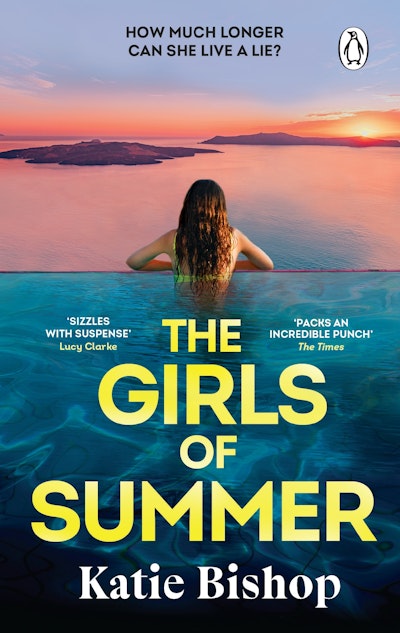We caught up with Katie Bishop to learn more about her debut novel, The Girls of Summer. Find out how #MeToo inspired the novel and what it was like writing during Covid lockdowns.
What was your writing process like for The Girls of Summer? Did you have a writing routine or any regular rituals?
I started writing The Girls of Summer during the first UK Covid lockdown. It was a time when everyone’s routines and structures had been upended and I had personally lost a lot of work. It was a scary time but, in a way, it made it easier to carve out a new routine that prioritised starting to write a book. I was working two jobs, so I would get up early – usually around six in the morning – and write for at least an hour before work (although I didn’t always manage it, particularly on cold, dark winter mornings when it felt almost impossible to get out of bed!).
How did you first come up with the idea for the book?
When I started writing The Girls of Summer in early 2020, we were beginning to see some of the aftershocks of the #MeToo movement.
Many women were coming to the slow realisation that many of their formative sexual experiences weren’t quite how they had perceived them at the time. My friends and I would often have conversations about consent and our lack of understanding about it before the #MeToo movement.
For many women, including myself, revisiting these experiences through the sharper lens of #MeToo was really shocking and sometimes horrifying.
At the same time, we were all stuck indoors and dreaming of far-flung, distant places. I had been drawn to the idea of writing a ‘one-that-got-away’ story based around a summer romance for a while, and the two ideas started to come together.
What if that great, first love that so many people idolise turned out to be not quite as you remembered it? How would you cope with the realisation that you’d possibly repressed that trauma for much of your adult life? This thought was the basis for The Girls of Summer.
What was your big break into publishing?
I didn’t know much about fiction publishing before I got a book deal. When agents started showing interest in The Girls of Summer, it was the first time that I felt like becoming a published author was a realistic prospect and not just a secret hobby.
I did some freelance journalism before I started writing The Girls of Summer and that gave me the confidence to pitch my work. It also gave me the resilience to deal with rejections and taught me how to tell a good story. So in a way, getting my first articles published was my break into publishing.
How long have you been working on this book?
Writing The Girls of Summer was an incredibly speedy process, which was a surprise for me. I had previously written another manuscript that took me about four years to finish!
The Girls of Summer came together much more quickly and, altogether, I probably spent about ten months writing.
I had planned to spend another six months editing, but when I put the chapters together and read the manuscript back, I realised that I was happy with the finished result and sent it out to agents after a few weeks of polishing up.
What was the publishing process like (finding an agent, submitting manuscripts, etc.)?
Surprisingly straightforward! I expected the process to be a huge slog because I had previously sent out another novel to forty agents without being signed. That was a heartbreaking process because I felt so invested in that novel and really couldn’t imagine going through the whole thing again. But thank goodness I did!
With The Girls of Summer, I sent out the first few chapters to a small selection of agents and quickly received requests for the full manuscript. Things moved quickly after that.
I signed with my wonderful agent Ariella and we whizzed through edits together, mostly over a very hectic week.
She then sent the manuscript out to publishers, and within a week we had multiple pre-empts.
At the time, I was staying in a caravan in Norfolk and the first offer came in as I was walking to the beach! By the following Monday, I had accepted an offer from my brilliant publisher.
It’s a bit of a cliché, but it was a complete dream come true.
What most excites you about your book being published in 2023?
Writing is such a private experience, so it’s surreal to think of The Girls of Summer being in the hands of readers.
I’m so excited for people to discover the book and to fall in love with the characters as much as I did while writing. As an author, you do feel that your characters are real people and it feels like such a privilege to share them with the world.
I also hope that the book will spark conversations around consent, sexuality, and power and look forward to engaging with readers on these really important topics.
Do you have a favourite book or author?
My answer to this question changes weekly! Recently, I’ve loved The Paper Palace by Miranda Cowley Heller, Cleopatra and Frankenstein by Coco Mellors, and Tomorrow and Tomorrow and Tomorrow by Gabrielle Zevin.
What inspired you to become a writer?
I don’t remember a time when I didn’t want to be a writer.
Books have always been a massive escape for me. Wherever I am in the world, or whatever problems I am going through, reading feels like home.
Writing gives me that same feeling but multiplied by a hundred.
I love the idea that something I've written might give people that same sense of comfort and connection. The thought still blows my mind a bit.
What did you want to be when you grew up and why?
Apart from a brief period when I was convinced it was both possible and plausible for me to be the tooth fairy, I only ever wanted to be a writer. When I got a bit older, I convinced myself that becoming a novelist was a complete pipe dream. I didn’t know anyone who worked in any kind of creative industry, and it just didn’t feel realistic to me.
I set aside the idea for a long time, but I think it was always somewhere in the background, waiting for me to come back to it.
If you could go back in time and give your past self one piece of advice, what would it be and why?
Trust your gut.
It’s easy to overthink things, compare yourself to other writers, or get tangled up in all of the different directions your story could go.
But your instinct is your most unique and important skill. Sometimes you need to shut out all of the noise to tune into it.
What is the best writing lesson/ tip you ever received?
I think that a lot of writing tips should be taken with a pinch of salt because it’s a hugely individual process, and no one piece of advice is going to suit everyone.
With that being said, something that Meg Mason said has stayed with me. Check in every day to make sure that you should keep going with whatever you’re working on rather than just pressing on.
Writing is so emotion-consuming and time-consuming that there’s a tendency to feel a bit of sunk-cost fallacy and think that you should keep working on something that you’ve poured your heart and soul into, even if you know – deep down – it’s not working.
Even if something never sees the light of day, I try to remind myself that I’ve learned to be a better writer from it. I’ve found out what I don’t want to do – and that has enormous value too. It’s important to know when to let go of something, as well as when to persevere.













